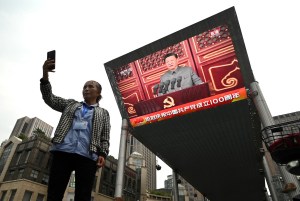The old Soviet Union’s centrally planned economy was so inefficient that Russians spent hours in lines hoping to buy scarce goods. In one biting Soviet joke from that era, a man was finally able to purchase a car, only to be told it would be delivered on a particular day five years hence. “Could it be another day?” he asked. “That’s the day the plumber is coming.”
For a couple of decades under Deng Xiaoping and his immediate successors, the other big communist country, China, eased up a bit on central planning and state domination of the economy. Free-market forces were unshackled; private ownership of businesses was allowed.
Getting rich was declared a good thing. China’s leaders offered a deal: You can have a better life as long as you stay out of politics. I remember a Beijing cab driver of that era boasting that the only thing he wasn’t free to do was criticize the government.
Which is to say, China’s people embraced the deal. The economy boomed. Hundreds of millions of Chinese were lifted out of poverty and into the middle class. China became an economic superpower, something the Soviets never came close to achieving.
Those were the days.
Today, under Xi Jinping, China has become more traditionally Marxist-Leninist again. Even though many state-owned enterprises are a drag on the economy, they get most of the bank loans. The Chinese Communist Party eyes fast-growing private companies warily, worrying they’ll become a rival source of power. Party officials have been installed in private companies’ executive suites.
Economic growth has slowed. As I mentioned in an earlier post, some foreign experts blame heavy-handed state intervention and argue it will be hard to get the economy back on track. They foresee “Japanification” – years, even decades, of economic doldrums, like the ones Japan experienced in the 1990s and beyond.

Now the New Yorker magazine has weighed in with a robustly reported piece that supports the Japanification case. Evan Osnos, the experienced China hand who wrote it, piles up anecdotes and statistics that more than justify the article’s pessimistic headline, “China’s Age of Malaise.”
Some of the tidbits he serves up are tantalizing. Standup comedians, Osnos reports, must now submit jokes for approval before telling them. The representatives of one comedian were fined US$2 million after he riffed on a Chinese military slogan in a joke.
Supreme leader Xi has a cult rivaling Mao Zedong’s. In this year’s first five months, the party published 11 books under his name, collecting his comments on a variety of topics.
Osnos says some business executives report being required to spend a third of the workday studying “Xi Jinping Thought on Socialism with Chinese Characteristics for a New Era.” The studies include reading four books a month, attending meetings, writing essays and taking tests.
Xi Jinping’s “thought” is more like Mao’s than Deng’s. Deng was famous for putting pragmatism ahead of ideology. It didn’t matter, he said, whether a cat was black or white as long as it caught mice. Xi’s view, Osnos says, is it doesn’t matter if the cat catches mice as long as it’s red – Communist.
With the party and the state intervening in daily life so heavily, caution reigns. Osnos was surprised how often Chinese spoke of Xi without mentioning his name and how many would only be quoted anonymously. “Disappearances have become the backbeat of public life under Xi,” he writes. It’s not just entrepreneurs. Recent disappearances include the foreign minister and defense minister.
Ask a Chinese version of ChatGPT if Xi Jinping is pragmatic, Osnos reports, and the answer is “Try another question.” Even China’s AI bots are cautious.

Many Chinese citizens are responding as you might expect. Some are finding ways around China’s capital controls and are parking money overseas. Others are leaving China.
Osnos reports that 300,000 moved away last year, more than double the rate a decade ago, and 10,800 of them were rich. Some emigres head for Singapore, but Osnos says 17,894 showed up on the US border with Mexico this summer, up 13 times over a year earlier.
China’s birth rate has plunged by more than half since 2016. The one-child policy has been lifted and young Chinese can legally have more children, but they don’t want them.
Private-sector jobs are no longer as attractive as they were before the crackdown. According to Osnos, 1.5 million Chinese have taken the civil service exam this year, up 50% since 2021.
None of this helps China’s economy; much of it detracts, potentially rendering impossible any near-term economic recovery. At the very least it makes recovery more difficult.
Economic woes don’t necessarily translate into weaker demand for foreign agricultural products, at least in the short run. People still have to eat. Still, if Osnos is right, this big market for America’s farmers and ranchers will no longer be a booming country with a seemingly endless appetite for imports.
Osnos’s view? “To spend time in China at the end of Xi’s first decade is to witness a nation slipping from motion to stagnation and, for the first time in a generation, questioning whether a communist superpower can escape the contradictions that doomed the Soviet Union.”
Former longtime Wall Street Journal Asia correspondent and editor Urban Lehner is editor emeritus of DTN/The Progressive Farmer.
This article, originally published on November 12 by the latter news organization and now republished by Asia Times with permission, is © Copyright 2023 DTN/The Progressive Farmer. All rights reserved. Follow Urban Lehner on Twitter: @urbanize

